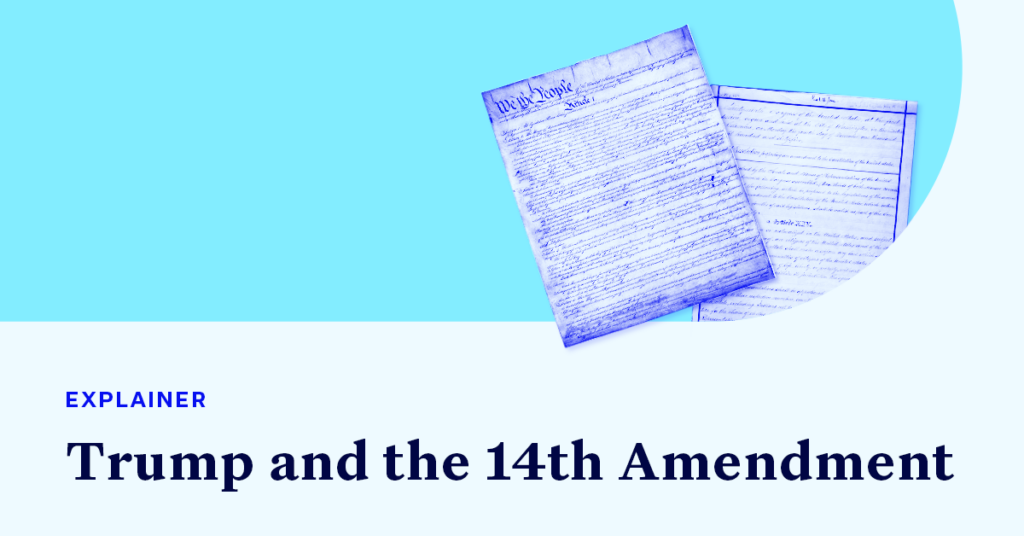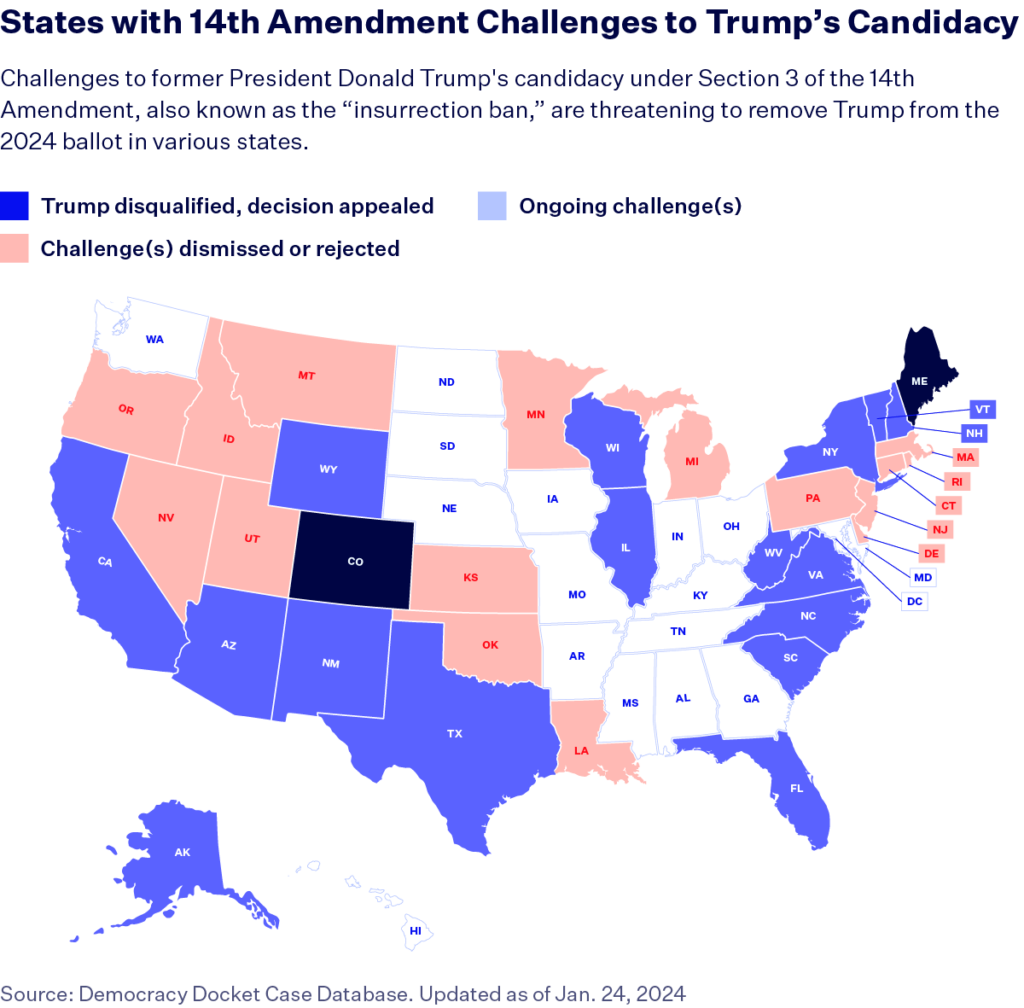Trump and Section 3 of the 14th Amendment

A provision of the 14th Amendment could have a profound impact on the 2024 elections as challenges to former President Donald Trump’s candidacy threaten to remove him from the ballot. In states across the country, this amendment has been used to disqualify Trump for his involvement in the Jan. 6, 2021 insurrection.
What is Section 3 of the 14th Amendment?
Section 3 of the 14th Amendment — also known as the Insurrection Clause — was ratified shortly after the Civil War in 1868. As Confederate states rejoined the Union, Southern states began electing former Confederate lawmakers and military officers to Congress and state legislatures. The newly elected members from the South threatened the viability of Republicans’ Reconstruction agenda, which included expanding the right to vote to Black men. To block former Confederates’ legislative agenda and prevent the country from entering into another Civil War, Republican legislators began drafting Section 3 of the 14th Amendment.
The final version of the Section 3 of the 14th Amendment reads as follows:
No person shall be a Senator or Representative in Congress, or elector of President and Vice President, or hold any office, civil or military, under the United States, or under any state, who, having previously taken an oath, as a member of Congress, or as an officer of the United States, or as a member of any state legislature, or as an executive or judicial officer of any state, to support the Constitution of the United States, shall have engaged in insurrection or rebellion against the same, or given aid or comfort to the enemies thereof. But Congress may by a vote of two-thirds of each House, remove such disability.
After the provision was enacted, southern states were slow to enforce the Insurrection Clause. In response, Congress passed the Military Reconstruction Act of 1867 to enforce Section 3 and prevent Confederate loyalists from participating in ratifying conventions. After the 14th Amendment was finally ratified, Congress passed the Enforcement Act of 1870, which allowed federal prosecutors to remove those who were disqualified from office under Section 3. In 1872, Congress, under political pressure to reconsider Section 3, passed the Amnesty Act of 1872 granting amnesty to most former Confederate officers.
Today, this 158-year old provision has propelled the nation into “uncharted territory.” Upon the announcement of former President Donald Trump’s 2024 presidential campaign, questions begin to surface about his eligibility under Section 3 given his actions leading up to the Jan. 6, 2021 insurrection. Across the country, dozens of challenges were filed with one overarching question: Is Trump disqualified from office under Section 3 of the 14th Amendment due to his involvement in the Jan. 6, 2021 insurrection?

To answer this question, courts have considered three substantive questions:
- Did Trump engage in an insurrection?
- Does Section 3 of the 14th Amendment apply to the office of the President?
- Does the oath that Trump took constitute an oath “to support the constitution”?
Did Trump engage in insurrection?
Challengers to Trump’s eligibility have argued in court filings that Trump engaged in insurrection by inflaming his supporters with false allegations of voter fraud in the aftermath of the 2020 election and attempting multiple schemes to overturn the election. After a week-long trial, a Colorado judge agreed and found that Trump did engage in insurrection.
The Colorado Supreme Court upheld the trial court’s determination finding that “the evidence amply showed that President Trump undertook all these actions to aid and further a common unlawful purpose that he himself conceived and set in motion: prevent Congress from certifying the 2020 presidential election and stop the peaceful transfer of power.”
Trump’s lawyers argue he did not engage in insurrection, but rather “called for peaceful and patriotic protest and respect for law and order.” They contend that Trump’s angry and violent rhetoric leading up to Jan. 6, 2021 was never intended to incite his supporters.
Does Section 3 apply to the office of president?
There are many questions concerning whether Section 3 applies to the office of President of the United States. Trump’s legal team acknowledges that Section 3 does not explicitly mention the office of President. They also assert that the U.S. Constitution’s “text and structure make clear that the president is not an ‘officer of the United States.’” They point to several constitutional provisions, including the Appointments Clause, that exclude the President as an officer of the United States.
The Colorado Supreme Court believes Section 3 does apply to the office of President. The court interpreted Section 3 based on constitutional context and “history surrounding the enactment of the Fourteenth Amendment.” The court maintains that the omission of the office of President from the text of Section 3 is “because it is so evidently an “office.” Additionally, Colorado’s high court stated “no specific office is listed in Section Three; instead, the Section refers to “any office, civil or military.”
Does the oath that Trump took constitute an oath “to support the constitution”?
The final question concerns whether the Presidential Oath is an oath that requires a pledge to support the Constitution. Trump’s lawyers believe that the Presidential Oath “does not include a pledge to “support” the Constitution.” The Colorado Supreme Court disagreed, finding the original language of the Presidential Oath includes a pledge to “preserve, protect, and defend the Constitution” which the court found to be consistent with supporting the Constitution.